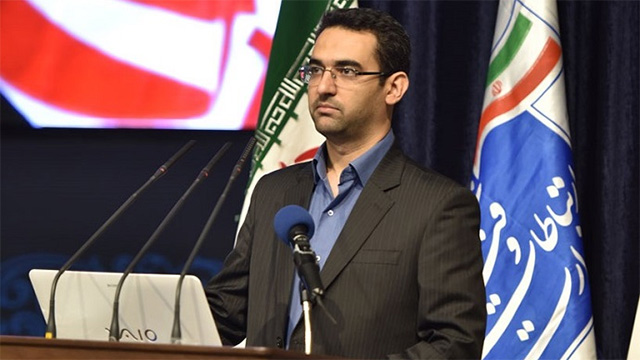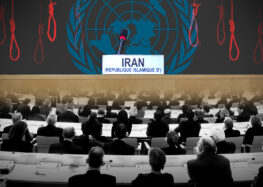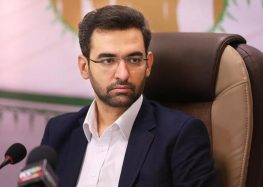Rouhani Cabinet Pick Linked to Mass Surveillance of 2009 Protesters

Mohammad Javad Azari Jahromi has been appointed by President Rouhani to head his telecommunications ministry.
Telecommunications Nominee Boasts of Aiding Iran’s State Spying Operations
August 16, 2017—President Hassan Rouhani’s pick to head the telecommunications ministry should publicly address concerns over his direct involvement with surveillance operations during the state crackdown on the peaceful protests in 2009 and allegations that he personally interrogated activists at the time, said the Center for Human Rights in Iran (CHRI) in a statement today.
Rouhani’s nomination of Mohammad Javad Azari Jahromi, who built parts of Iran’s massive surveillance infrastructure while working in the Intelligence Ministry, to lead the Ministry of Information and Communications Technology (ICT) has led to concerns among civil rights activists that Jahromi could use his new position to expand already extensive online state spying operations on citizens.
“Selecting a man who said he’s ‘proud’ of making the technical infrastructure for the surveillance industry is a sharp shift from Rouhani’s election campaign promises to protect citizens’ rights,” said CHRI’s executive director Hadi Ghaemi.
“Rouhani should nominate someone who will protect citizens’ rights, not someone linked to human rights violations through the work he did for the Intelligence Ministry,” he added.
A member of Parliament and activists have spoken out against Rouhani’s nomination of Jahromi, who purchased surveillance equipment for the Intelligence Ministry during former President Mahmoud Ahmadinejad’s second term (2009-13).
“Don’t turn the telecommunications ministry into a second Intelligence Ministry,” warned MP Mohammad Ali Pourmokhtar on August 15, 2017 during deliberations in Parliament over Jahromi’s nomination.
On August 12, a few days before Parliament deliberated his nomination, Jahromi denied reports that he directed intelligence operations under Ahmadinejad while adding the he was “proud” of aiding the Intelligence Ministry in another way.
“We have legal surveillance based on Article 150 of the Criminal Procedures Law passed by Parliament,” said Jahromi in front of the parliamentary Committee on Social Affairs.
“During my activities I was not in charge of wiretapping but in charge of building the technical infrastructure industry for this purpose and I’m proud of it.”
Aiding Iran’s Citizen Surveillance Operations
While Jahromi was working in the Intelligence Ministry’s surveillance department in 2009, the Iranian government was on a buying spree to modernize its electronic spying operations and strengthen its ability to intercept messages and hack citizens’ online accounts.
Thousands of activists and protesters were arrested in 2009 for peacefully disputing the re-election of Ahmadinejad that year in a state crackdown.
The equipment the Intelligence Ministry purchased while Jahromi was heading the infrastructure project—including wiretapping gear, geo-locators and voice recognition apparatus—was used by the ministry, the Islamic Revolutionary Guard Corps’ Intelligence Organization and other domestic security organizations to spy on Iranian citizens, suppress freedom of expression and intimidate civil rights workers and dissidents without judicial review.
“Worrying about electronic surveillance has become a daily part of life since 2009,” a civil rights activist in Tehran who spoke on condition of anonymity told CHRI on August 14. “Since then we have had to take the battery out of our phones or turn them off on a regular basis for fear of being monitored.”
“I even remember my interrogator talking about conversations that I had only had with another person on the phone,” added the activist. “It was impossible for anyone to have known about them without phone tapping.”
In 2009, Iranian human rights lawyer and Nobel Peace laureate Shirin Ebadi and other human rights activists campaigned against sales of Nokia Siemens Networks’ equipment to Iran “after several prisoners, including Mr. [Issa] Saharkhiz said that they had been abused as a result of the Iranian government’s utilization of technology and software sold by Nokia Siemens.”
In September 2010, the telecommunications giant stopped selling monitoring equipment to Iran after months of negotiations with Ebadi, who criticized the threat they posed to the security of Iranian online users.
The state’s surveillance operations also targeted elected Parliamentary representatives. In a letter to Supreme Leader Ali Khamenei in 2013, conservative MP Ali Motahari revealed that he was being illegally spied on.
“Under Article 25 of the Constitution, ‘eavesdropping, and all forms of covert investigation are forbidden, except as provided by law’ and the judge can order them for a certain period only for serious crimes such as in a murder investigation,” said Motahari. “To wiretap MPs, the Parliament speaker should first be informed. However, neither he nor the judiciary was aware of this matter.”
CHRI has also confirmed that five activists in Iran were personally interrogated by Jahromi amid the state repression of the peaceful protests that erupted in 2009 in response to the widely disputed election of Mahmoud Ahmadinejad that year. They were all members of the campaign team for Mir Hossein Mousavi, who was running for president at the time.
Fearing retribution by security forces, the people who were interrogated by Jahromi have refused to speak out about their cases publicly. However, associates of theirs have relayed some of their experiences on social media.
On August 14, Hamzeh Ghalebi, who worked on Mousavi’s campaign team, tweeted that a friend of his, a former political prisoner, was personally interrogated by Jahromi in 2009: “He confirmed that Jahromi had been his interrogator who treated him badly.”
“Two of my friends who were arrested in 2009 confirmed that not only was Jahromi their interrogator, but that he also took part in home search and seizure operations,” tweeted reformist journalist Nahid Molavi on August 14.
“Rouhani’s pick for the telecommunications ministry casts a shadow on a president who was twice elected on a platform of improving civil rights,” said Ghaemi.
“Rouhani has a duty to ensure that the integrity of the telecommunications ministry, which is responsible for protecting citizens’ online communications, is not jeopardized because of Jahromi’s relationship with the Intelligence Ministry,” he added.






